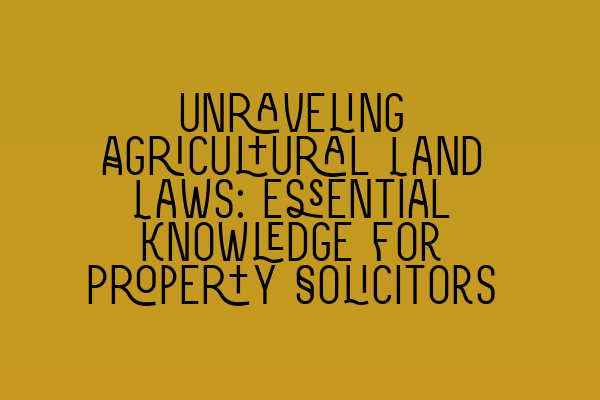Unraveling Agricultural Land Laws: Essential Knowledge for Property Solicitors
As a property solicitor, it is crucial to have a deep understanding of agricultural land laws. Agricultural land is a unique category of property that requires specialized knowledge and expertise to navigate. In this blog post, we will explore the key elements of agricultural land laws that every property solicitor should be familiar with.
The Basics of Agricultural Land Laws
Agricultural land laws govern the ownership, use, and transfer of land specifically used for agricultural purposes. These laws are designed to ensure the sustainability and productivity of farming and other agricultural activities. As a property solicitor, you will encounter various aspects of agricultural land laws, including:
- Land Use Regulations
- Planning Permissions and Consent
- Land Tenure and Leases
- Environmental Regulations
Let’s delve deeper into each of these areas.
1. Land Use Regulations
Understanding land use regulations is essential when dealing with agricultural land. These regulations dictate what activities can be carried out on agricultural land, such as farming, livestock rearing, and forestry. It is important to be familiar with local and national land use policies and restrictions to ensure compliance.
You need to be aware of any changes or updates to land use regulations, as they can significantly impact landowners and affect property transactions involving agricultural land. Staying updated with relevant legislation and case law is key to providing accurate and sound advice to your clients.
If you want to test your knowledge on SQE 1 Practice Exam Questions, click here.
2. Planning Permissions and Consent
Obtaining planning permissions and consent is a crucial step in any property development, and agricultural land is no exception. When advising clients on agricultural land transactions, it is important to consider any planning permissions and rules that may apply to the land.
Applications for planning permissions on agricultural land often require careful consideration of factors such as environmental impact assessments, rural development policies, and conservation regulations. Familiarizing yourself with the planning process and associated regulations will enable you to guide your clients through the necessary steps to obtain the required permissions.
If you’re looking for practice mocks to prepare for the SQE 1 exam, check out SQE 1 Practice Mocks FLK1 FLK2.
3. Land Tenure and Leases
Agricultural land often involves complex land tenure arrangements and leases. As a property solicitor, you must understand the different types of tenure systems and lease agreements that may apply to agricultural land.
Common land tenure systems in agricultural settings include freehold, leasehold, and share farming arrangements. Likewise, agricultural leases have specific considerations, such as rent review mechanisms, repair obligations, and termination provisions. Having a comprehensive understanding of these aspects will ensure that you can draft appropriate agreements and provide effective advice to your clients.
If you want to explore SQE 2 Preparation courses to enhance your legal knowledge and skills, click here.
4. Environmental Regulations
Environmental regulations play a significant role in agricultural land laws. Agricultural activities can have substantial environmental impacts, and it is crucial for property solicitors to consider and advise on any environmental regulations and obligations that apply to agricultural land transactions.
Issues such as pollution control, waste management, and biodiversity protection should be taken into account when dealing with agricultural land. Familiarize yourself with national and local legislation relating to environmental protections to ensure that your clients are in compliance with the relevant regulations.
For comprehensive preparation for the SQE 1 exam, check out our SQE 1 Preparation Courses here.
Conclusion
As a property solicitor handling agricultural land transactions, possessing a solid understanding of agricultural land laws is crucial. By familiarizing yourself with land use regulations, planning permissions and consent requirements, land tenure and leases, and environmental regulations, you will be in the best position to provide sound advice and guidance to your clients.
Stay up-to-date with the latest legal developments and consider enhancing your knowledge and skills through SQE exam preparation courses. The more you know about agricultural land laws, the better equipped you will be to navigate the complexities of this specialized field.
For more information on SQE exams, including exam dates and requirements, visit SRA SQE Exam Dates.
